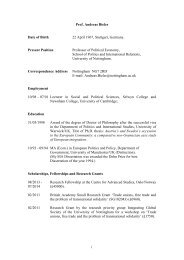Dr Gurnam Singh and Dr Stephen Cowden ... - Andreas Bieler
Dr Gurnam Singh and Dr Stephen Cowden ... - Andreas Bieler
Dr Gurnam Singh and Dr Stephen Cowden ... - Andreas Bieler
- No tags were found...
You also want an ePaper? Increase the reach of your titles
YUMPU automatically turns print PDFs into web optimized ePapers that Google loves.
11 | P a g epower <strong>and</strong> powerlessness, which frame his discussion within Pedagogy of the Oppressed. Heexpressed this as follows:11 | P a g eThe oppressed suffer from a duality, which has established itself in their innermostbeing. They discover that without freedom they cannot exist authentically. Yetalthough they desire authentic existence, they fear it. They are one <strong>and</strong> the same timethemselves <strong>and</strong> the oppressor whose consciousness they have internalised. The conflictlies in the choice between…following prescription or having choices, between beingspectators or actors…between speaking or remaining silent (1996:30).For Freire pedagogy was the basis by which education produced silent domesticated studentsfor whom ‘learning’ remained entirely separate to their consciousness <strong>and</strong> subjectivity, asopposed to students who were given licence to speak in their own voices <strong>and</strong> in that processdiscover <strong>and</strong> develop insights into both themselves as well as the world they lived in. Hiscentral distinction is between what he calls “banking education” <strong>and</strong> “problem posingeducation”. Within banking education students are conceived of as:...”receptacles” to be “filled” by the teacher. The more completely she fills thereceptacles, the better teacher she is. The more meekly the receptacles permitthemselves to be filled, the better students they are. Education thus becomes an act ofdepositing, in which the students are the depositories <strong>and</strong> the teacher is thedepositor...In the banking concept of education, knowledge is a gift bestowed by thosewho consider themselves knowledgeable upon those who consider they knownothing...The students, alienated like the slave in the Hegelian dialectic, accept theirignorance as justifying the teacher’s existence – but unlike the slave, they neverdiscover that they educate the teacher (1970:53)Problem-posing education, sees the fundamental purpose of education as concerned with:… posing the problems of human beings in their relations with the world ...[It] consistsof acts of cognition, not transferrals of information...The teacher is no longer the onewho-teaches,but one who is himself taught in dialogue with the students, who in turnwhile being taught also teach (1970:60-61)This idea of education where the teacher <strong>and</strong> the student are both engaged in teaching eachother <strong>and</strong> learning from each other reflects the deep egalitarianism <strong>and</strong> democratic impulse inFreire’s philosophy. The teacher’s Knowledge is not a private accumulation, but rathersomething that becomes efficacious through engagement with students. We see the Frierianidea of dialogue not just as about the inherent value of people talking with each other, butrather as a mutual engagement based on a dialectical interchange of theory <strong>and</strong> experience.We see this model of banking as one that has been massively revived in the contexts of newinstrumental pedagogies. While we noted earlier the paradox of student wants <strong>and</strong> needs, wethink it is very important to note the significance of recent research in this area. The good



